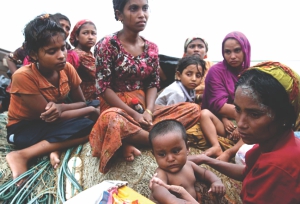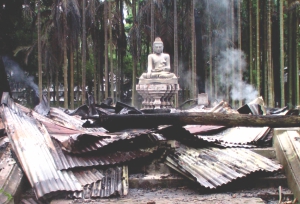|
Forum Home |
2012: LESSONS LEARNT
This New Year, Forum looks back at some key issues of the past year and how things could have been different. In the final year of the government's tenure, 2013, can these lessons learnt make a difference in re-establishing and strengthening its credibility and popularity among the people who voted it into power with a majority mandate?

Breaking the culture of impunity
2012 was an unfortunate year of violence and death amidst deteriorating law and order. From the killings of television journalists Sagar Sarwar and Meherun Runi in their own home towards the beginning of the year, to the murder of Bishwajit Das, a 24-year-old tailoring shop owner on his way to work during an opposition-called countrywide blockade last month, the message to the people seems to have been that no one is safe, anywhere, doing anything. The usual play of denial and blame has only served to delay the process of justice. Numerous protests from various groups in society have managed to keep the agenda in the news so far, but other than grand promises made by one minister after another, there has been little to reassure the people of their safety and that justice will be done. The culture of impunity, which seems to have been haunting us since independence with the still pending trial of war criminals, must end.
Increasing financial vigilance
Last year witnessed a number of irregularities in the financial sector, amongst which the Hall-Mark loan scam outshined all. Loopholes in the financial system have given rise to irregularities time and again, not only in Bangladesh but in other countries too. However, the Hall-Mark scam should be considered as a red-light for the ruling regime because of its link to nationalised banks and alleged link to an adviser to the Prime Minister. The scam also brought up the lack of coordination and likely dissent between government bodies -- the Bangladesh Bank and the Ministry of Finance. In fact, the Finance Minister's initial comments about the issue and the government's failure to take immediate actions against the culprits involved in the scam also sent out a wrong signal throughout the sector. Such incidents not only call for immediate legal action but also policy level changes to identify and eliminate the loopholes in the financial sector.
 Accepting responsibility Accepting responsibility
Amongst the four democratically elected governments since 1990, the second term of the Awami League-led government faced the most unprecedented allegations of corruption against two of its ministers, coincidentally both in 2012. Though the former Communication and Technology Minister Syed Abul Hossain's alleged involvement in the Padma Bridge graft came up in 2011, he tendered his resignation only after the World Bank cancelled the Padma Bridge loan. Former Railway Minister Suranjit Sengupta similarly reacted late and resigned almost a week after a large amount of what was allegedly bribe money was found in a car headed for his home. In both cases, the government defended its ministers and procrastinated on taking meaningful action. This only bagged criticism from different quarters and questioned the transparency and accountability of the regime. The ruling party should keep in mind that, while presumption of innocence until proven guilty is a legal right, in the case of political leaders, image plays a significant role and it cannot be cleansed with certification from an Anti-Corruption Commission which has given rise to questions regarding its own accountability.
Maintaining a positive international image
 International economists have forecast that by 2050, Bangladesh is going to outperform the western economies. Till then, as a developing nation it is essential that our image in the international arena remains positive in all aspects. Though the Awami League-led regime received much praise for its strict stance against terrorism, it faltered in a number of other issues in 2012. One of them is the amendment of the Grameen Bank ordinance and the treatment of Nobel Laureate Prof Mohammad Yunus. Even the Prime Minister in her interview with the BBC did not exercise restrain in showering her spite against Dr Yunus. More tact needs to be maintained in handling questions regarding our internal affairs. Our Foreign Ministry should make the best use of its diplomatic ties to generate support from the international community in issues such as the Rohingya influx and War Crimes Tribunal. In fact, the ruling party needs to make sure that these issues are not politicised and put to question before international observers. International economists have forecast that by 2050, Bangladesh is going to outperform the western economies. Till then, as a developing nation it is essential that our image in the international arena remains positive in all aspects. Though the Awami League-led regime received much praise for its strict stance against terrorism, it faltered in a number of other issues in 2012. One of them is the amendment of the Grameen Bank ordinance and the treatment of Nobel Laureate Prof Mohammad Yunus. Even the Prime Minister in her interview with the BBC did not exercise restrain in showering her spite against Dr Yunus. More tact needs to be maintained in handling questions regarding our internal affairs. Our Foreign Ministry should make the best use of its diplomatic ties to generate support from the international community in issues such as the Rohingya influx and War Crimes Tribunal. In fact, the ruling party needs to make sure that these issues are not politicised and put to question before international observers.
Practising what you preach
 Despite some setbacks, Bangladesh is a nation known for its communal and cultural harmony. Thus the attacks on the Buddhist community in Ramu of Cox's Bazaar and the destruction of thousands of years old heritage, along with other attacks on minority groups last year has not only blighted the nation's image internationally but shocked the nation and filled the hearts of minority communities with fear. And, while extrajudicial killings decreased in the past year, enforced disappearances took their place, the most notable case being that of Bangladesh Nationalist Party (BNP) leader Ilias Ali who has been missing since April 2012. Despite progress in various areas, women, continue to battle for their rights, especially against violence, despite their being guaranteed in the Constitution, the National Women Development Policy and Bangladesh's commitment to the Millennium Development Goals to promote gender equality and empower women. All this goes to show that laws and pledges are all well and good, but their effective implementation coupled with political will is what can make the difference. Despite some setbacks, Bangladesh is a nation known for its communal and cultural harmony. Thus the attacks on the Buddhist community in Ramu of Cox's Bazaar and the destruction of thousands of years old heritage, along with other attacks on minority groups last year has not only blighted the nation's image internationally but shocked the nation and filled the hearts of minority communities with fear. And, while extrajudicial killings decreased in the past year, enforced disappearances took their place, the most notable case being that of Bangladesh Nationalist Party (BNP) leader Ilias Ali who has been missing since April 2012. Despite progress in various areas, women, continue to battle for their rights, especially against violence, despite their being guaranteed in the Constitution, the National Women Development Policy and Bangladesh's commitment to the Millennium Development Goals to promote gender equality and empower women. All this goes to show that laws and pledges are all well and good, but their effective implementation coupled with political will is what can make the difference.
|


 Accepting responsibility
Accepting responsibility International economists have forecast that by 2050, Bangladesh is going to outperform the western economies. Till then, as a developing nation it is essential that our image in the international arena remains positive in all aspects. Though the Awami League-led regime received much praise for its strict stance against terrorism, it faltered in a number of other issues in 2012. One of them is the amendment of the Grameen Bank ordinance and the treatment of Nobel Laureate Prof Mohammad Yunus. Even the Prime Minister in her interview with the BBC did not exercise restrain in showering her spite against Dr Yunus. More tact needs to be maintained in handling questions regarding our internal affairs. Our Foreign Ministry should make the best use of its diplomatic ties to generate support from the international community in issues such as the Rohingya influx and War Crimes Tribunal. In fact, the ruling party needs to make sure that these issues are not politicised and put to question before international observers.
International economists have forecast that by 2050, Bangladesh is going to outperform the western economies. Till then, as a developing nation it is essential that our image in the international arena remains positive in all aspects. Though the Awami League-led regime received much praise for its strict stance against terrorism, it faltered in a number of other issues in 2012. One of them is the amendment of the Grameen Bank ordinance and the treatment of Nobel Laureate Prof Mohammad Yunus. Even the Prime Minister in her interview with the BBC did not exercise restrain in showering her spite against Dr Yunus. More tact needs to be maintained in handling questions regarding our internal affairs. Our Foreign Ministry should make the best use of its diplomatic ties to generate support from the international community in issues such as the Rohingya influx and War Crimes Tribunal. In fact, the ruling party needs to make sure that these issues are not politicised and put to question before international observers.  Despite some setbacks, Bangladesh is a nation known for its communal and cultural harmony. Thus the attacks on the Buddhist community in Ramu of Cox's Bazaar and the destruction of thousands of years old heritage, along with other attacks on minority groups last year has not only blighted the nation's image internationally but shocked the nation and filled the hearts of minority communities with fear. And, while extrajudicial killings decreased in the past year, enforced disappearances took their place, the most notable case being that of Bangladesh Nationalist Party (BNP) leader Ilias Ali who has been missing since April 2012. Despite progress in various areas, women, continue to battle for their rights, especially against violence, despite their being guaranteed in the Constitution, the National Women Development Policy and Bangladesh's commitment to the Millennium Development Goals to promote gender equality and empower women. All this goes to show that laws and pledges are all well and good, but their effective implementation coupled with political will is what can make the difference.
Despite some setbacks, Bangladesh is a nation known for its communal and cultural harmony. Thus the attacks on the Buddhist community in Ramu of Cox's Bazaar and the destruction of thousands of years old heritage, along with other attacks on minority groups last year has not only blighted the nation's image internationally but shocked the nation and filled the hearts of minority communities with fear. And, while extrajudicial killings decreased in the past year, enforced disappearances took their place, the most notable case being that of Bangladesh Nationalist Party (BNP) leader Ilias Ali who has been missing since April 2012. Despite progress in various areas, women, continue to battle for their rights, especially against violence, despite their being guaranteed in the Constitution, the National Women Development Policy and Bangladesh's commitment to the Millennium Development Goals to promote gender equality and empower women. All this goes to show that laws and pledges are all well and good, but their effective implementation coupled with political will is what can make the difference.